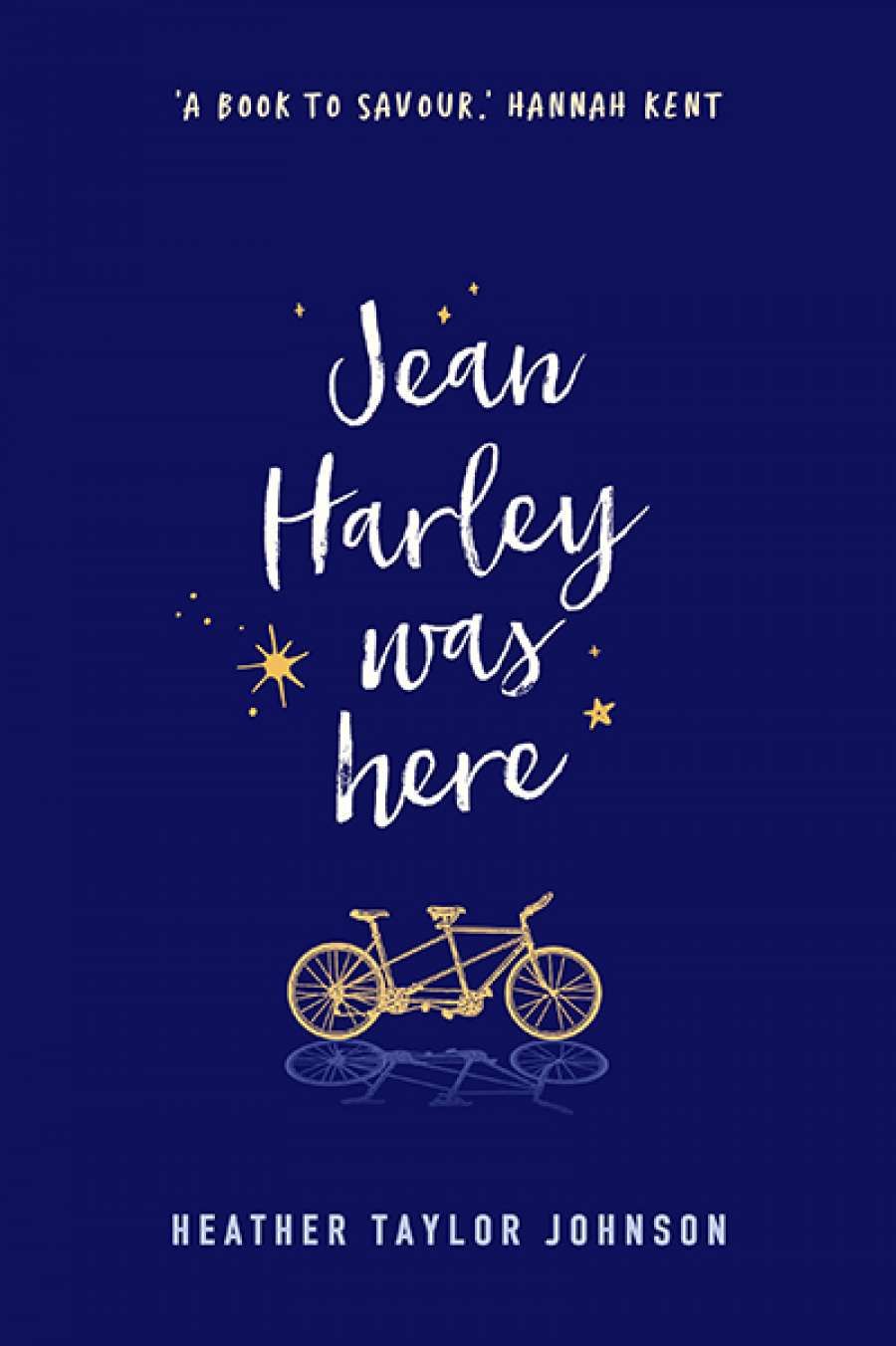
- Free Article: No
- Contents Category: Fiction
- Custom Article Title: Anna Spargo-Ryan reviews 'Jean Harley Was Here' by Heather Taylor Johnson
- Review Article: Yes
- Online Only: No
- Custom Highlight Text:
There is much to like about a well-executed set of short stories, and this is true of Jean Harley Was Here. While the book presents itself as a novel, it has more in common with Elizabeth Strout’s ...
- Book 1 Title: Jean Harley Was Here
- Book 1 Biblio: University of Queensland Press $29.95 pb, 242 pp, 9780702259548
As the story goes on, more and more characters are introduced, many through their own point of view chapters. There is plenty to follow here. With so many character perspectives, at times the book doesn’t seem to quite know what it is. It is novel-like, in that it moves chronologically forward, and the characters develop over time. But it also resembles a collection: each chapter is titled, and there are too many different points of view for it to form one narrative. This confusion, at times, makes it challenging to orient oneself in the story. At 242 pages, it is already a short work; the inclusion of so many stories means not all of them have enough time to develop fully.
What Jean Harley Was Here lacks in depth, it exploits in breadth. What is nice about this structure is that it clearly illustrates just how many people are affected by one death. This is not a story about a widower, his young son, and their profound mourning, but an exploration of the way life has to go on for everyone in a community. For a book about grief, it is surprisingly upbeat, and mostly avoids sentimentality. Taylor Johnson’s accomplished writing moves freely between the poetic and commercial, creating a compelling rhythm: ‘What she wanted to say was that she was bluer than the ocean outside her window because she was bleeding the red, heavy discard of her what-if.’
Having said that, there is no real through-line beyond ‘how will everyone cope?’ The subplots of the many narrating characters, therefore, have been given their own complications. In some ways, it is made more moving by its individual consideration of those affected, even where their perspectives are less robust. The experiences of the women are fervently explored, covering love, loss, friendship, infidelity, abortion, infertility, childlessness, and ageing.
To Taylor Johnson’s credit, she manages these many different threads skilfully. The chronology is sound, and the characters develop in realistic and interesting ways. Stan’s chapters offer the most insight into the period after a loss. He is resolute but heartbroken. The magnitude of their love is frequently reinforced, never more so than in ‘The List’, a wonderful testament to the one who remains. Though the voice of Orion – five at the time of Jean’s death – is not as convincing, the naïveté of his experience is sincere and touching. Later, the addition of Jean’s American niece adds a cross-generational story that adds texture, perspective, and, crucially, youth.
 Heather Taylor Johnson (photograph courtesy of University of Queensland Press)Inevitably, some stories are more successful than others. The introduction of Jean’s old professor in ‘Baumgartner’s Jump’, for example, occupies a lot of space for a comparatively small trade-off. ‘Licking the Wound’, told from the perspective of the family dog, adds little. It would be remiss not to mention Charley, who fits neither of these categories. He is given considerable coverage to reflect on his feelings about the accident, and how his history led him to that moment. His relationship with an offscreen pen pal feels overworked, and forms part of an ending that ever so slightly misses its mark. But he is also the flip side of Jean’s many mourners: the guilt he bears rounds out the story, which would be worse off without him.
Heather Taylor Johnson (photograph courtesy of University of Queensland Press)Inevitably, some stories are more successful than others. The introduction of Jean’s old professor in ‘Baumgartner’s Jump’, for example, occupies a lot of space for a comparatively small trade-off. ‘Licking the Wound’, told from the perspective of the family dog, adds little. It would be remiss not to mention Charley, who fits neither of these categories. He is given considerable coverage to reflect on his feelings about the accident, and how his history led him to that moment. His relationship with an offscreen pen pal feels overworked, and forms part of an ending that ever so slightly misses its mark. But he is also the flip side of Jean’s many mourners: the guilt he bears rounds out the story, which would be worse off without him.
What ties these many threads together is the clear autobiographical element. Like Jean, Taylor Johnson herself moved from America to Australia, and the book is dedicated to a late friend. Her lived experience comes through in a way that is unlaboured and that highlights the minutiae of what it is like to carry on without someone. This is not a deep musing on the futility of life, nor does it try to unravel every element that makes up the complex fabric of grief. It is just people getting on with things, and finding – or not finding – what they need in their shared loss.
Unlike the recently released Barking Dogs (Affirm Press, 2017), these are not stand-alone stories: they rely on one another. But unlike Olive Kitteridge, nor do they make a ‘novel’. Jean Harley’s story is one in vignettes, à la Love Actually (2003). It brings out only what needs to be told, and the main characters come together for a satisfying – if occasionally sentimental – ending.


Comments powered by CComment